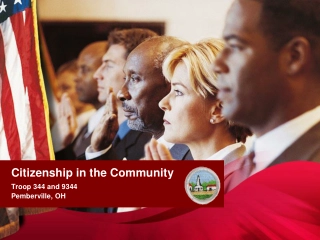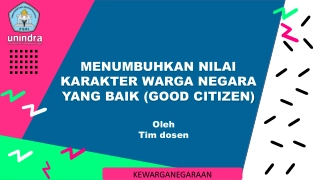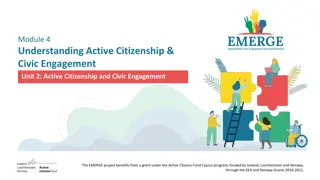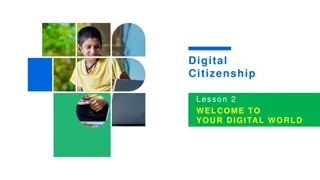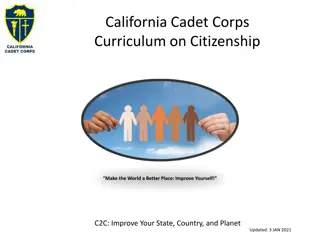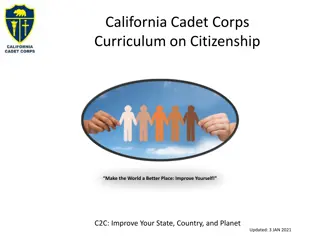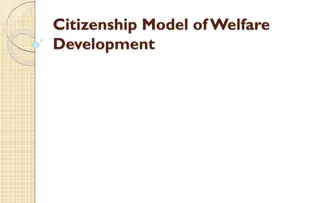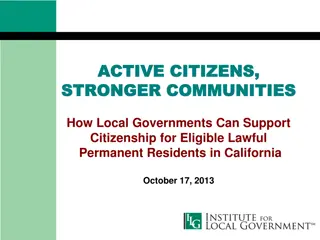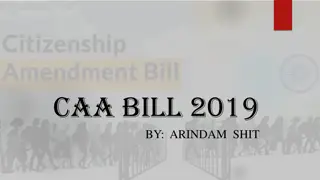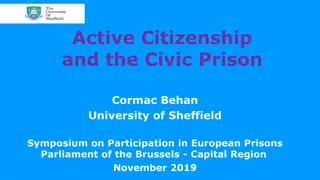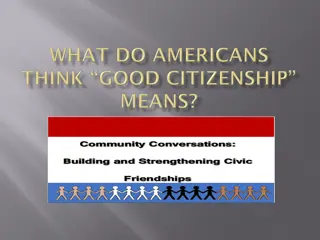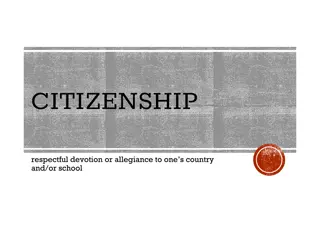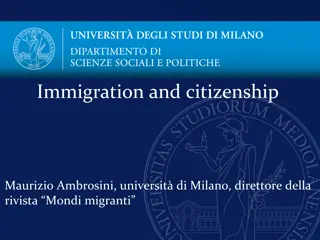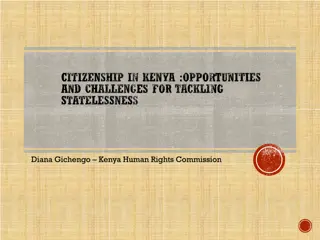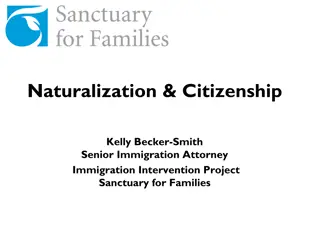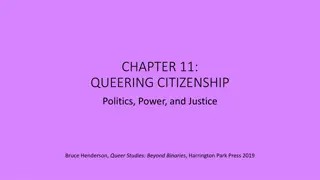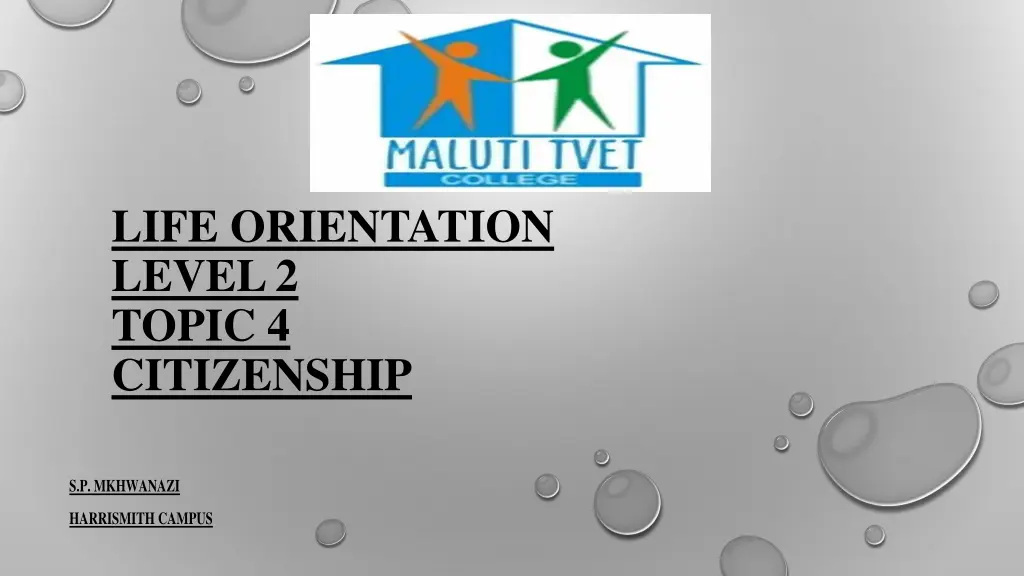
Understanding Citizenship, Human Rights, and Equality
Explore the concepts of citizenship, human rights, and equality. Citizenship defines one's legal status in a country, while human rights encompass fundamental freedoms and entitlements. Equality ensures fairness and non-discrimination. Learn about the importance of the Bill of Rights in protecting these principles and the responsibility to uphold rights for all.
Download Presentation

Please find below an Image/Link to download the presentation.
The content on the website is provided AS IS for your information and personal use only. It may not be sold, licensed, or shared on other websites without obtaining consent from the author. If you encounter any issues during the download, it is possible that the publisher has removed the file from their server.
You are allowed to download the files provided on this website for personal or commercial use, subject to the condition that they are used lawfully. All files are the property of their respective owners.
The content on the website is provided AS IS for your information and personal use only. It may not be sold, licensed, or shared on other websites without obtaining consent from the author.
E N D
Presentation Transcript
LIFE ORIENTATION LEVEL 2 TOPIC 4 CITIZENSHIP S.P. MKHWANAZI HARRISMITH CAMPUS
What is Citizenship? Citizenship is the position or status of being a citizen of a particular country. Citizenship is the status of a person recognized under the custom or law as being a legal member of a sovereign state or belonging to a nation. The idea of citizenship has been well-defined as the capacity of individuals to defend their rights in front of the governmental authority. Different states and nations recognize citizenship of a persons according to their own policies, regulations and criteria as to who is entitled to their citizenship. A person may have multiple citizenships. A person who does not have citizenship of any state is said to be stateless, while one who lives on state borders whose territorial status is uncertain is a border-lander.
Human Rights What are Rights? Rights are legal, social, or ethical principles of freedom or entitlement. Rights are the fundamental normative rules about what is allowed of people or owed to people according to some legal system, social convention, or ethical theory. Human rights are moral principles or norms that describe certain standards of human behaviour and are regularly protected as natural and legal rights in municipal and international law. They are commonly understood as unchallengeable, important rights "to which a person is inherently entitled simply because she or he is a human being and which are "inherent in all human beings" regardless of their age, ethnic origin, location, language, religion, ethnicity, or any other status. They are applicable everywhere and at every time in the sense of being universal and they are open in the sense of being the same for everyone.
The Bill of Rights The Bill or Rights is also often called the declaration of rights or charter of rights. A Bill of Rights is a list of the most important rights to citizens of a country. The purpose of the Bill of Rights is to protect those human rights against violation from public officials and private citizens. This Bill of Rights is the foundation of democracy in South Africa. It protects the rights of all people in our country and upholds the democratic values of human dignity, equality and freedom. The state must respect, protect, promote and fulfil the rights in the Bill of Rights. Human Rights and Responsibilities As the containers of human rights and important choices, all individuals and communities in the exercise of their rights and freedom have the obligations as well as responsibility to respect those of others and a duty to make every effort for the promotion and fulfilment of their rights.
The Right to EQUALITY o Equality is the state of being equal, especially in status, rights, or opportunities. o Discrimination is the unfair or harmful treatment of different categories of people particularly on the grounds of race, gender and ethnicity. o Everyone is equal before the law and has the right to equal protection and benefit of the law. o Equality includes the full and equal enjoyment of all rights and freedoms. To promote the achievement of equality, legislative and other measures designed to protect or advance persons, or categories of persons, disadvantaged by unfair discrimination may be taken.
o The state may not unfairly discriminate directly or indirectly against anyone on one or more grounds, including race, gender, sex, pregnancy, marital status, ethnic or social origin, colour, sexual orientation, age, disability, religion, conscience, belief, culture, language and birth. o No person may unfairly discriminate directly or indirectly against anyone on one or more grounds in terms of subsection. National legislation must be enacted to prevent or prohibit unfair discrimination. o Discrimination on one or more of the grounds listed in subsection is unfair unless it is established that the discrimination is fair. Responsibilities o To ensure that every individual is treated equally and fairly. o Not discriminate unfairly against anyone on the basis of race, gender, religion, nationality, ethnicity, disability, culture, language, status, social origin or appearance.
The Right to Human Dignity o Everyone has inherent dignity and the right to have their dignity respected and protected. o It is the right of a person to be appreciated and valued for their own sake, and also to be treated ethically. Responsibility o To treat people with reverence, respect and formality. o To be kind, compassionate and sensitive to every human being, including greeting them warmly and speaking to them courteously.
The Right to Life o Everyone has the right to life. o Nobody, not even the state, has the right to take a life. This means that no person can be sentenced to death by the courts. Responsibilities o Protect and defend the lives of others. o Not endanger the lives of others by carrying dangerous weapons or by acting recklessly or disobeying our rules and laws. o Live a healthy life, by exercising, eating correctly by not smoking, abusing alcohol, or taking drugs, or indulging in irresponsible behaviour that may result in my being infected or infecting others with communicable diseases such as HIV and AIDS.
The Right toFreedom and security of the person o Everyone has the right to freedom and security of the person, which includes the right not to be deprived of freedom arbitrarily or without just cause, not to be detained without trial. o To be free from all forms of violence from either public or private sources, not to be tortured in any way and not to be treated or punished in a cruel, inhuman or degrading way. o Everyone has the right to bodily and psychological integrity, which includes the right to make decisions concerning reproduction, to security in and control over their body and not to be subjected to medical or scientific experiments without their informed consent. Responsibilities o Not to hurt, bully, or intimidate others. o Not to allow other individuals to violate or abuse me. o Solving any conflict in a peaceful manner. o Making sure that no one can be put in prison without good reason, be detained without trial, be tortured in any way or be treated or punished in a cruel, inhuman or degrading way.
Slavery, servitude and forced labour The Right to Fair Labour (to work) o No one may be subjected to slavery, servitude or forced labour. o No one has the right to own you like a piece of property and have you work for them forcefully under the threat of punishment. o Every individual must work willingly and in a safe environment. Responsibilities o This right carries with it the responsibility for all learners, parents, caregivers and teachers to: o To work hard and do our best in everything we do. o To recognise that living a good and successful life involves hard work, and that anything worthwhile only comes with effort. o This right must never be used to expose children to child labour. o Make sure you prevent children for being exposed to child labour.

